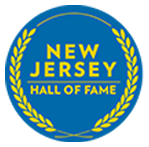Jerry Izenberg
Sports journalist
Born: September 10, 1930, in Newark, New Jersey
New Jersey Hall of Fame, Class of 2018: Arts & Letters
There’s a photo of Jerry Izenberg playfully landing a left jab on the right cheek of Muhammad Ali. Above the Champ’s head is his signature with the simple salutation: “To Jerry.” The photo represents much of what made Izenberg a journalism giant, from his bold nature to his ability to win the respect of the greatest sports icons.
Izenberg grew up in Newark, where he played baseball and basketball and learned to sneak into the old Ruppert Stadium to watch the Newark Bears, a minor-league affiliate of the New York Yankees, and the Newark Eagles, a Negro League team whose roster included future big leaguers (and New Jersey Hall of Famers) Larry Doby and Monte Irvin. Years later, Izenberg would become a personal friend of both Doby and Irvin.
After high school, Izenberg worked his way through Rutgers University in Newark, taking part-time jobs in a chemical factory and as a copy boy (literally an errand boy or “gopher”) at what was then the New Jersey Star-Ledger. The pay for a copy boy was $6 a night; more importantly, the job was his introduction to the newspaper that would be his professional home for decades.
Izenberg served in the military during the Korean War, then restarted his journalism career at the Paterson Evening News, the Star-Ledger and the New York Herald Tribune. He returned to the Star-Ledger as a columnist and went on to cover some of the most memorable sporting events of the last half of the 20th century. According to a Rutgers profile, these included the first 53 Super Bowls, from 1967 to 2019; 55 consecutive runnings of the Kentucky Derby; countless baseball games (including the World Series); and more of Ali’s heavyweight fights than any other writer.
In addition to his newspaper work, Izenberg created the “Sports Extra” TV show in the 1970s; hosted an NBC radio show, “Sports With Jerry Izenberg,” in the 1980s; and produced, wrote and/or narrated 35 network TV documentaries. He also has written 15 non-fiction books. At the age of 90, he wrote his first novel, “After the Fire,” an interracial love story set in the aftermath of the 1967 Newark riots. In 1979, he created Project Pride, a nonprofit to aid disadvantaged kids in Newark.
